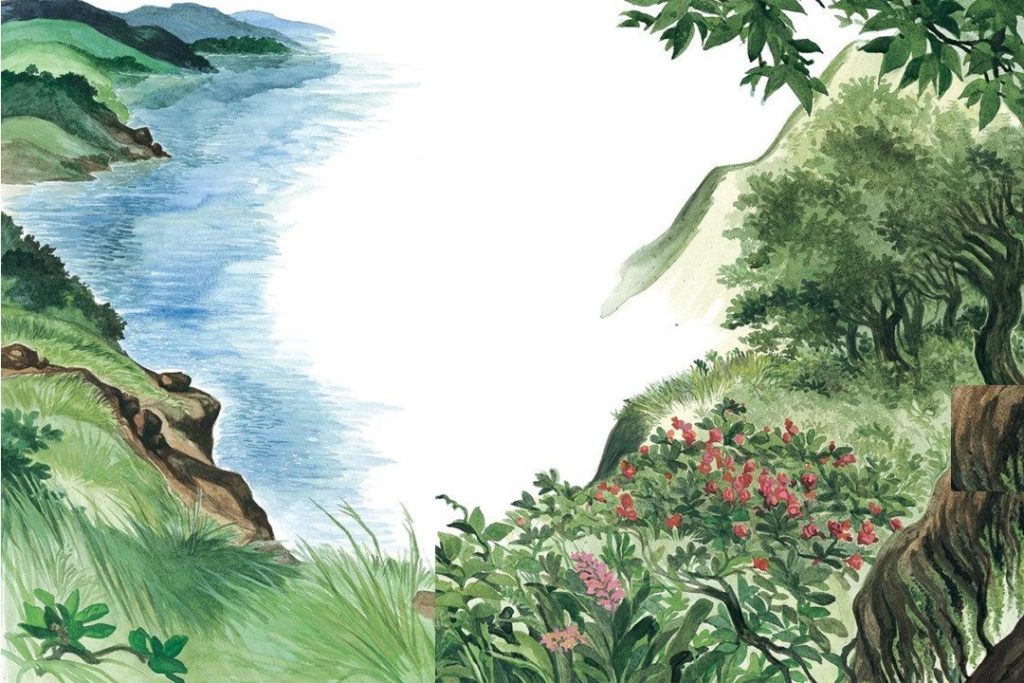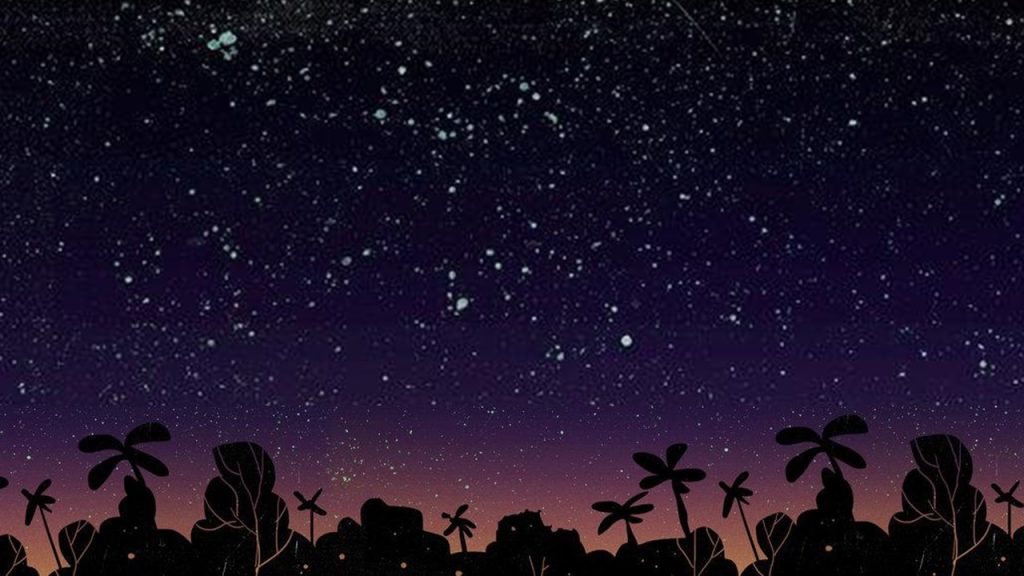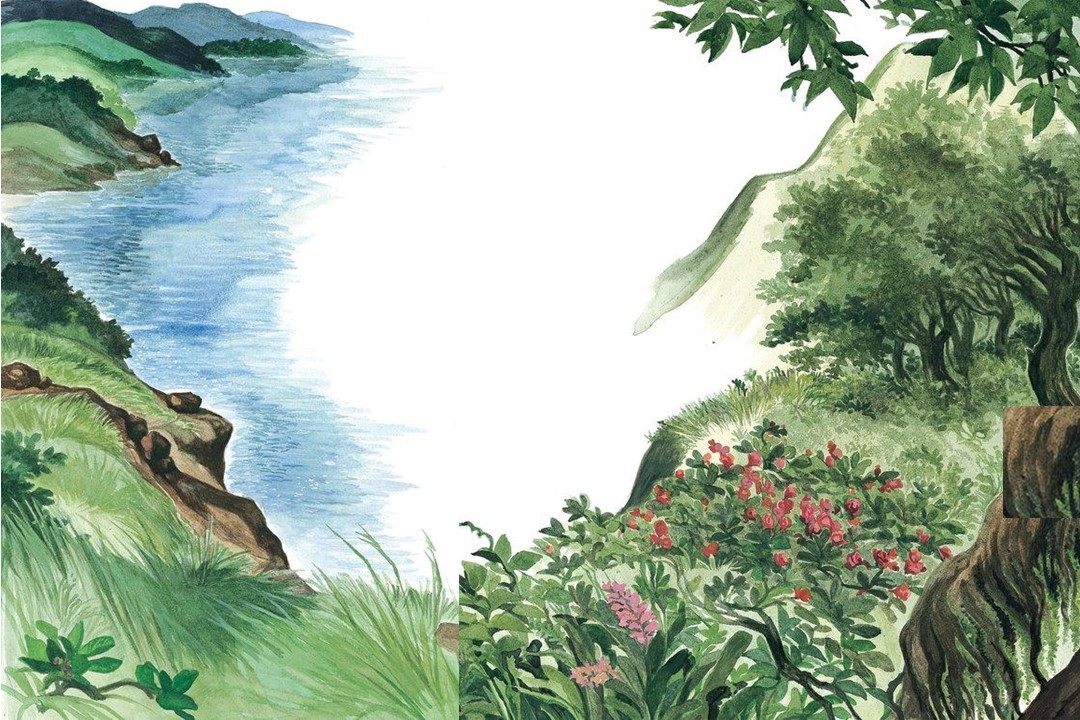Mwedzi and Dziva

Long ago, the earth was empty, covered only by a vast body of water called Dziva (which means “lake”). There were no animals, no birds, and not even a single plant. In the sky, however, there was Nyadenga (which means “The One Above”), Zuva (the sun), Mwedzi (the moon), countless stars, and drifting clouds.
Dziva lay still and silent, seeming sorrowful. Noticing this, Nyadenga spoke to Mwedzi, saying, “Go down to the earth and live with Dziva.” Then he took Mwedzi and placed him in the water.
Nyadenga had made Mwedzi able to swim and breathe underwater. With his presence, Dziva came to life—its surface rippling at last. Yet, as time passed, Mwedzi began to feel lonely. He called out to Nyadenga, “Dziva is no longer sad, but now I am. What has brought him joy has become my burden. I am all alone. Isn’t there somewhere else I can go? Perhaps I could find something to lift my spirits.”
Nyadenga replied, “Shall I bring you back up here, just as before?”
“Not back there,” Mwedzi said. “Somewhere else.”
Nyadenga considered this. “It is better for you in the water. But if you are certain you no longer wish to stay, I will take you out. Know this, though—once you leave Dziva, you may never return!”
With that, Nyadenga lifted Mwedzi from the water and placed him on dry land, near the shores of Dziva. Then, he transformed Mwedzi into a man, giving him the ability to live on land. Finally, he handed Mwedzi a horn filled with oil.
Mwedzi accepted the gift with gratitude, feeling a new sense of purpose. He bowed his head and thanked Nyadenga.
Nyamatsatsi
Out on land, Mwedzi struggled to adapt. It wasn’t what he had expected. The air was cold, and the barren land stretched endlessly—no grass, no trees, no animals. He was still lonely and soon realized how much he needed the water. Hunger gnawed at him, and the cold bit into his skin. Over time, his misery deepened. He had had enough. Oh, how he longed to return to Dziva.
Desperate, Mwedzi began to weep, and the sound of his own sorrow surprised him. Nyadenga heard his cries and asked, “Now, what troubles you?”
Mwedzi poured out his frustrations, telling Nyadenga of the loneliness, the cold, and the hunger.
“I did warn you that the water was better,” Nyadenga said. “But I will give you someone to keep you company. Perhaps she will make life on land easier for you.”
Nyadenga took one of the brightest stars from the sky and shaped it into a woman—Nyamatsatsi, the Morning Star. She would be Mwedzi’s companion. Then, Nyadenga handed her two fire-making sticks and turned to Mwedzi.
“Nyamatsatsi will stay with you, but only for two years,” he said.
Mwedzi gazed at her in awe. Nyamatsatsi was radiant, and he felt an immediate fondness for her. At last, he would not be alone.
As evening fell and the chill deepened, they searched for shelter and found a cave. As they settled inside, Nyamatsatsi turned to Mwedzi.
“We should make a fire to keep warm,” she said, handing him the fire-making sticks.
Mwedzi took the male stick and twirled it against the female. Smoke curled into the air, embers glowing at the base. Nyamatsatsi carefully kindled the sparks until flames danced before them. They rejoiced—their first fire! Its warmth wrapped around them, and they lay on opposite sides of the flames, watching as they flickered between them.
Mwedzi felt a sense of peace. He was no longer alone, and now they had fire to keep them warm. Perhaps the land wasn’t so bad after all.
Reaching for his horn of oil, he dipped his index finger into it and began to sing:
(Song)
“I am going to jump over to the other side, and back.
I am going to jump over to the other side, and back.
I am going to jump over to the other side, and back.”
Then, Mwedzi leaped over the fire to Nyamatsatsi. Gently, he touched her body with the oil on his finger. Afterward, he jumped back to his side, lay down, and drifted into sleep.
The offspring of Nyamatsatsi

Just before daybreak, Nyamatsatsi was jolted awake by an excruciating pain in her back. Terrified, she cried out to Mwedzi. Startled, he sat up and peered at her from the other side of the fire. What he saw filled him with shock—her belly was swollen, and she writhed in agony. Mwedzi hurried to her side, doing his best to calm and comfort her.
As the first light of dawn broke across the sky, Nyamatsatsi let out a piercing scream. Mwedzi watched, both frightened and awestruck, as she began to bear. From her came grasses, bushes, and trees. She gave birth to all the plant life, and suddenly, the earth was transformed—lush greenery spread across the land.
The trees grew tall, their tops reaching the clouds. When they touched the sky, rain began to fall, quenching the land and making it even more fertile. Mwedzi and Nyamatsatsi now had everything they needed.
From the trees, Mwedzi fashioned timber and built a hut. He discovered iron, forged a hoe, and began to farm the land. They had fruit and grain to eat. Meanwhile, Nyamatsatsi tended to their home—she gathered firewood, fetched water, cooked meals, and even made clothes for them both.
They had plenty, and life was blissful.
Marinda

Before they knew it, two years had passed. True to his word, Nyadenga took Nyamatsatsi away and placed her at the bottom of Dziva. Mwedzi was heartbroken, weeping uncontrollably. He had lost his mate and now had to learn to live without her. Yet, he found he could not do the things she had done for him. Now, he was alone, cold, and hungry.
“Nyadenga, what am I to do without Nyamatsatsi?” Mwedzi asked. “Who will help me fetch water and cook?” Inconsolable, he cried for eight days.
Nyadenga, filled with pity, finally spoke. “Do you remember when I told you that the water was a better place for you? Now look at yourself, crying in sorrow. Still, I will give you another companion. I will give you Marinda—the ‘evening star.’ Like Nyamatsatsi, she will be with you for only two years.”
As he had with Nyamatsatsi, Nyadenga took Marinda, one of the brightest stars, and transformed her into a woman. Mwedzi was grateful for Marinda’s presence, though he still missed Nyamatsatsi.
On their first night together, as Mwedzi prepared to lie down on one side of the fire he had built, Marinda stopped him. “Please, come lie close to me,” she said. He obeyed and lay beside her. Then, as Mwedzi took his horn and dipped his index finger to moisten it with oil, Marinda stopped him once again. “I am not like Nyamatsatsi,” she said. “Now, smear the oil on your loins, and then on mine.” Mwedzi did as instructed, and the two coupled before drifting into sleep.
Continued at Ngano| The moon and how the world was made: Part Two
‘Ngano yaMwedzi nerusiko’ is an adaptation, by Shungu Constance Chidovi, of a creation story of the VaShona. The recording of this legend is attributed to Leo Frobenius (1873–1938). Illustrations used: Cloud, sky and lightning, by Greystroke; Enormous sea hugging the hills, Snake, and Forest by Maya Ramaswamy; Animals by Rob Owen; edit of Ape and crocodile by Abraham Muzee; edit of A boy flying into the sky by Vishnu M Nair; Water splashing, and edit of Girl with her hand on her head by Upamanyu Bhattacharyya; all published under a CC BY 4.0 license on StoryWeaver.


Captivating…I can’t wait for the second episode…
Stay tuned!